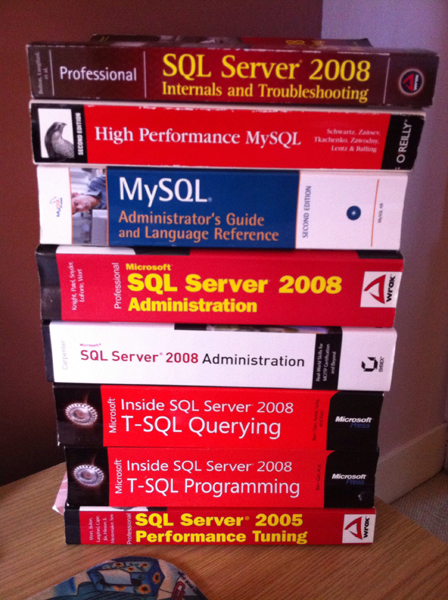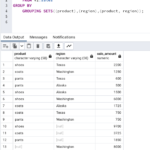In my current role, we have a mixture of SQL Server and MySQL installations and over the courses of time, I have built up a fair size collection of books on these two database platforms.
I keep some of them at home. As we have grown as a family, available space in the house has subsequently reduced and I sometimes receive polite complaints from my better half because of the amount of SQL literature that can be found around the house. Well she did marry a computer nerd! 🙂
Here is a collection of my most used and favourite SQL books and if you look closely, the top two are definitely what I would call “well loved”. A bit like a child’s favourite teddy bear where it is bit rough around the edges having been played with so often.
Yes these are my “teddy bears”. Probably my favourite task working as a DBA is performance tuning. Perhaps it is a boy thing – fast cars and all that.
In my case, I think it stems from when I first got into building computers way back in 1997. I was an I.T apprentice back then and it was always “cool” to upgrade your PC to the fastest processor or have the latest graphics card. Such efforts were all geared around playing computer games and making my system as fast as possible so that I, or rather the computerised version of me, fully loaded with various rocket launchers and machine guns, could run around a Quake II arena with minimal system drag.
When I am notified about a performance issue with a query or users complain of general system performance, it is these problems which I particularly enjoy solving and when I am in learning mode, I tend to read these types of books the most.
The first book on the pile is “Professional SQL Server 2008 Internals and Troubleshooting” which is co-written by SQL Server experts Christian Bolton, Justin Langford, Brent Ozar, James Rowland-Jones and Steven Wort.
This is a great book and I am not the only person who thinks so as on Amazon.com and Amazon.co.uk it gets 5 stars.
This post is not intended to be a book review and so I will keep this brief but subjects covered in the book start at looking at the architecture of SQL Server by covering ACID properties and SQL Server transactions through to how to build a Management Data Warehouse to store performance statistics generated by your servers. It contains masses of detailed content and is in excess of 550 pages long.
My second favourite is one called “High Performance MySQL”. Again, very informative. Topics cover, for example differences between the MySQL engines as well as troubleshooting, optimization, scaling, performance tools and many others.
I must mention the two books on T-SQL in the pile, second and third from the bottom who amongst the co-authors is a guy called Itzik Ben-Gan who I would describe as a T-SQL black belt. If you want to get really good T-SQL then read his books.
What will be my next SQL book?
As I wrote in an earlier post I am considering sitting the SQL Server 2012 exams. Microsoft are soon to release a book on the 70-462 exam on “Administering Microsoft SQL Server 2012 Databases” which is available from Amazon on pre-order via this link and due to be released July 17th 2012.
What good SQL books can you recommend?



Hi,
Thanks for the great comments, I’m glad you like the book! I’m working on “Professional SQL Server 2012 Internals & Troubleshooting” at the moment with a couple of the previous authors and a few new ones – look out for it Oct/Nov time! 🙂
Cheers,
Christian
Hi Christian
Thanks for your comment. Will do. 🙂
Best Wishes
Andy
Good…. Liked your Collection………..